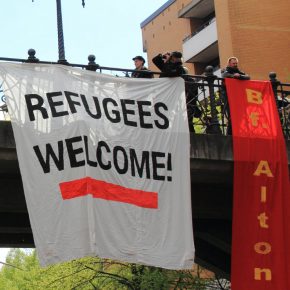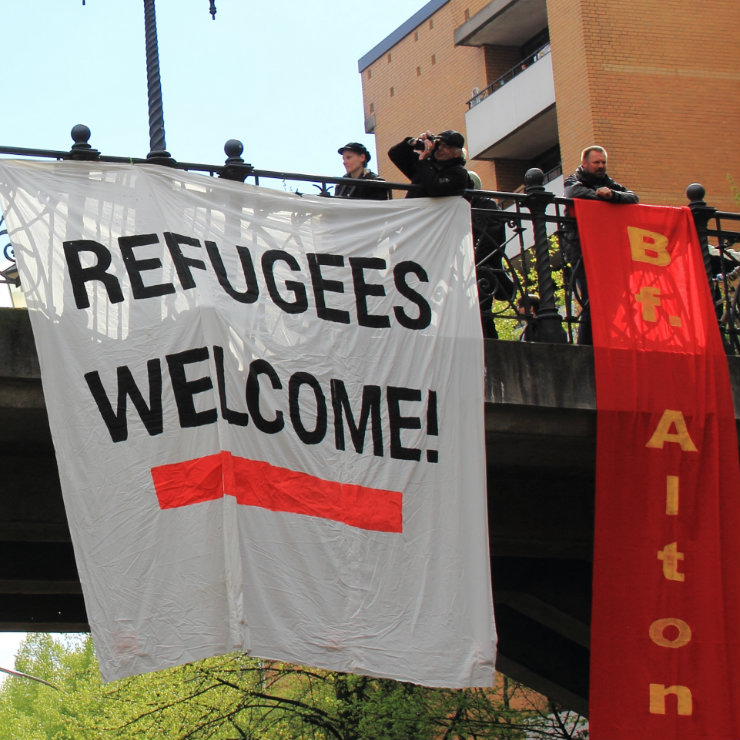Tydzień w gospodarce
Category: Raporty

Hamburg, Germany (Rasande Tyskar, CC BY-NC)
The problem is that both sides have serious economic and social studies to back up their views.
The crisis dates to September 2015, when about 800,000 refugees arrived in Germany, as a result of the country’s decision to open its borders to refugees stuck in Hungary. Chancellor Angela Merkel declared that there were no limits to the number of refugees Germany could accept.
Some German politicians declared this new policy to be a great humanitarian gesture. Others saw it as an enlightened political choice serving German interests, given the country’s labour shortage, historically low unemployment (6.4 per cent, the lowest since 1991), low interest rates (in the second quarter of this year it was 0.08 per cent) and rising tax revenues.
But Merkel’s policy is coming under growing criticism. The decision to accept more than 1 million Muslim refugees in 2015 and 2016 raised serious concerns about Germany’s ability to integrate them. Already in 2006 the Friedrich-Ebert Stiftung (a political foundation close to the left-wing Social Democratic Party) published a report claiming that right-wing extremism is neither a problem at the margins of the German society nor is it mainly a phenomenon of Eastern Germany, since it can found the very middle of the German society. More recent political developments seem to confirm the findings, as the Federal Criminal Police Office counted more than 1,000 violent attacks on the asylum seeker homes in Germany in 2015. The crisis propelled the AfD (The Alternative for Germany) anti-immigration party to new levels of popularity, winning seats in regional parliaments in both eastern and western Germany earlier this year. The party, whose leading politicians openly espouse racist positions, may win more than 10 per cent of the vote in next year’s federal elections.
Berlin is trying to put an upbeat spin on the refugee influx by highlighting their positive economic impact. Many of those optimistic arguments are based on a 2015 analysis conducted by the German Institute for Economic Research (DIW). It claims that refugees will help the economy over the long term. The analysis by Marcel Fratzscher and Simon Junker makes a number of assumptions — such as the continuing but decreasing influx of refugees until 2020, a very high number of working-age refugees and their growing productivity —which allows them to make an optimistic prediction of a boost to the German economy as well as increased incomes. The main thrust of the argument is a Keynesian one: An increase in demand (based both on private and public consumption) not only balances the initial costs incurred by the German state, but also benefits the broader economy by considerably increasing GDP per capita. In a sense, expenditures on refugees (new public administration personnel, additional language courses payed by the state, construction of new asylum seeker homes as well as direct payments to the refugees — annually on average EUR12,000 per refugee) amounts to a huge stimulus package.
However, critics say the DIW analysis is not just based on overly optimistic assumptions (e.g. a relatively quick absorption of refugees by the labour market) and ideological biases (e.g. stimulus packages can create inflation, rather than generate only productivity gains, as claimed by the DIW) but also on faulty calculations. An analysis by the Centre for Applied Economic Research at the Münster University (the authors are Ulrich van Suntum and Daniel Schultewolter) argues that when correctly calculated the DIW model would actually create an annual net burden of EUR14.3bn.
As well, there could be negative wage effects, as the refugee influx is likely to reduce the per capita income of low skilled workers by 26.6 per cent, while the per capita income of skilled workers would increase by only 0.8 percent.
This negative outlook is also supported by the Ifo-Institute for Economic Research in Munich whose (now former) head Hans-Werner Sinn sees the influx of refugees as a source of growing economic inequality and instability. According to Sinn, not only will the refugees become a huge burden on Germany’s welfare state, but because of their poor education (based on OECD pre-war data on Syria, 75 per cent of Syrian refugees are functionally illiterate) they are likely to become part of the underprivileged class of poor, unemployed and largely uneducated people. Even calculated conservatively, one generation of refugees is likely to increase Germany’s public debt by EUR450bn, thus putting a serious strain on the country’s economy. Even the young age of many refugees is of limited advantage, as employees with low qualifications pay less tax and make smaller social contributions. This suggests that the refugees will have a marginal positive impact on Germany’s aging society and its strained pension system, contrary to what the optimists have been claiming.
The Ifo-Institute also calculated that a reintroduction of national border controls in Germany would actually be much less expensive than accepting more refugees. While the new border control regime would limit trade and thus reduce the German economy by about EUR15bn, it would be still cost much less than an uncontrolled influx of refugees, which the Ifo-Institute estimated would cost EUR21bn. While it is highly unlikely that Germany will introduce national border controls on its entire territory, the calculation highlights the economic dilemma at hand and emphasises that Berlin’s refugee policy is fundamentally subject to political decisions without a clear economic guidance.
To make the conundrum even more complicated, the widely diverging economic assessments of the impact of migrants may be very well a reflection of political views. Marcel Fratzscher, head of the DIW, is an economic adviser to Merkel and Sigmar Gabriel, the minister for economic affairs (both are supporters of the “open arms” refugee policy). That has caused some observers to question the DIW’s political independence.
The Müster analysis on the other hand might also be biased, as one of the authors, Ulrich van Suntum, used to be a member of the economically liberal wing of the AfD, which after a split from the AfD formed a new liberal fringe party ALFA (Alliance for Progress and Renewal) favouring a conservative approach to state budgeting.
Whatever the bias, the huge assessment divergences show Merkel has taken a serious risk with her refugee policy. Should the economic trend turn out to be negative, it could have huge political consequences, particularly given Germany’s souring attitude towards refugees. According to a 2016 survey by Jürgen Schupp, only 28 per cent of the respondents were in favour of refugees being accepted without time limits, while a majority approved only a temporary stay for humanitarian reasons. More than half saw more risks than opportunities from the refugee influx. A series of attacks in Germany carried out by perpetrators of migration and refugee background in 2016 (Essen, Würzburg, Munich and Ansbach) are likely to increase the risk perception in the German society in the months to come.
A political backlash against the current refuge policy is possible, which could not only further decrease the popularity of the current government but also threaten Germany’s political system by boosting the AfD. This right-wing newcomer party might even become the country’s second largest party in the next ten years, skewing the political system of Germany to the right.
In May, Berlin agreed on a new integration law requiring refugees to participate in measures such as German language courses and job training. As well, refugees will not have the right to leave their designated place of residence — to keep them from creating ethnic neighborhoods. One of the main measures of the integration law is a labor market program to quickly find jobs for refugees.
The worry is however that the program could artificially boost employment, paid for by the state. So-called “one-euro jobs” have been a feature of Germany’s state employment agencies for years but remain controversial. The ostensible goal is to integrate the long-term unemployed into the labor market, but the main benefit could be mainly political, as those in the program do not appear in official unemployment statistics. With regard to the refugees this could camouflage the real extent of their unemployment in the next years, only selling it to the public as a success of the government.
In sum, the refugee crisis is far from over and its economic impact is uncertain — migrants could boost economic growth under certain institutional circumstances, but there is also a serious risk of creating a new class of economically underprivileged, poorly educated and unemployed people. This would replicate the serious problems of the French banlieues, rather than become a far-sighted solution to the shortages of the German labor market.
Ireneusz Pawel Karolewski is an Associate Professor of Political Science, Willy Brandt Centre for German and European Studies, University of Wroclaw in Poland. He was Kosciuszko foundation fellow at Center for European Studies, Harvard University in 2014 and Visiting professor at the John F. Kennedy School of Government, Harvard University in 2015. His research interests are social and political theory, European Union governance and EU foreign policy.

